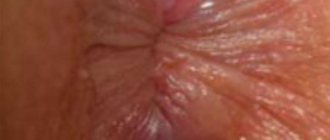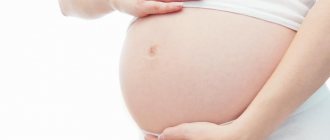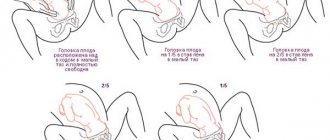Rating: No rating
The joyful anticipation of a baby is often accompanied by such an unpleasant phenomenon as hemorrhoids. Speaking about the risk groups most susceptible to this disease, doctors clearly include among them those people who engage in heavy physical labor, lead a sedentary lifestyle and... pregnant women.
A pregnant woman is in the most provocative situation, since the enlarging uterus puts pressure on the pelvic organs, leading to stagnation of blood in the veins of the rectum and their varicose veins. If an expectant mother suddenly encounters this disease, she should consult a specialist and begin treating the disease immediately , so as not to harm herself or her child in any way. Remember! You and your baby now share a common bloodstream, so be more careful than ever.
What is hemorrhoids, its types and stages
Hemorrhoids are the most common coloproctological disease, affecting about 12% of the population of our planet.
The reasons for this are many factors: hereditary characteristics of the structure of the veins, the use of certain medications, dietary habits, and even participation in sports in which the pelvic area moves negligibly (auto and cycling, rowing, equestrian sports, etc.). For women, the cause of hemorrhoids can even be heavy bags, which each of us had to carry home more than once.
The disease itself is caused by pathological enlargement and inflammation of the venous plexus of the rectum , thrombosis and circulatory disorders in the pelvis.
According to the mechanism of occurrence, hemorrhoids are divided into congenital and acquired . The latter includes hemorrhoids, both as an independent disease and as a symptom of another, often more terrible disease (for example, cirrhosis of the liver).
Based on location, hemorrhoids are divided into two types: external and internal.
Doctors distinguish four stages of hemorrhoids .
- The first is characterized by a sensation of a foreign body in the rectum, bloating, itching, pain in the anus during bowel movements and a tendency to frequent constipation.
- At the second stage, mucous or bloody discharge from the anus and the formation of hemorrhoids are added to this.
- In the third, nodes fall out against the background of constant incessant pain and bleeding, cracks appear in the anus and rectum, which provokes an inflammatory process, even accompanied by an increase in temperature.
- The fourth stage is different in that it is not possible to straighten the nodes on your own, incontinence of gases and feces appears, mucus and blood are released profusely.
Symptoms and causes of hemorrhoids during pregnancy
The signs of hemorrhoids during pregnancy have already been mentioned, but they are worth listing again and remembering: discomfort, a feeling of incomplete bowel movement, bloating, pain during bowel movements or constant pain, anal itching and bleeding - this is how this disease can begin in any pregnant woman.
causes of hemorrhoids during pregnancy:
- At this time, the pelvis is filled with blood, the pressure in it is increased, and the vessels are not always able to cope with the increased load. And excess progesterone further reduces their tone.
- An enlarged uterus puts pressure not only on the internal organs, but also on the venous system itself, in particular on the inferior vena cava.
- Physical inactivity characteristic of pregnant women. Or, to put it more simply, a sedentary lifestyle that a woman is sometimes forced to lead in this position. Low physical activity, like nothing else, contributes to blood stagnation, subsequent thrombosis and the formation of hemorrhoids.
- Decreased intestinal tone. It's no secret that the incidence of constipation in pregnant women sometimes increases significantly. Difficulties during defecation lead to irritation and overstrain of the hemorrhoidal veins and again, as a consequence, to the formation of nodes.
The likelihood of hemorrhoids also depends on the number of births. For example, in primiparous women it is only 20% of the total, but in multiparous women it already increases to 40-50%, especially starting from the third semester. The more pregnancies there are, the higher the percentage of exacerbation of the disease during pregnancy due to repeated changes in intra-abdominal pressure.
The effect of hemorrhoids on pregnancy and childbirth
Fortunately, hemorrhoids do not pose a serious danger during pregnancy and practically do not cause complications during its course. However, it should be remembered that periodic bleeding may worsen anemia, and problems with bowel movements may threaten miscarriage and premature birth. Complicated forms of hemorrhoids during pregnancy and childbirth include: thrombosis, strangulation and necrosis of hemorrhoids, paraproctitis, incessant bleeding.
Is it possible to give birth with hemorrhoids? Can! Doctors say that there are no contraindications to natural childbirth. However, it must be taken into account that the presence of hemorrhoids will complicate the process itself, making it even more painful and unpleasant. Remember that during childbirth the nodes may burst, and this will lead to even greater blood loss. That is why it is necessary to prepare for childbirth especially carefully and under the supervision of an experienced specialist.
But it also happens that the starting point for the occurrence of hemorrhoids was the process of childbirth itself. And the disease makes an immature woman even more vulnerable to any complications. Now that the body needs recovery, hemorrhoids can weaken it, becoming an open gate for any infection. And yet, hemorrhoids after pregnancy are not an obstacle to happy motherhood! Because while at home, with your baby, you can follow all the doctor’s appointments, improve your diet, and even find time for special gymnastics that will strengthen the muscular system in the pelvic area.
Treatment of illness in the last stages of pregnancy
Treatment of hemorrhoids in the final stages depends entirely on the diagnosed stage of the disease. It is worth understanding that the choice of drugs for pregnant women is much less extensive, since there are real risks of harming the health of the child. In order to prescribe competent and effective treatment, a specialist must conduct a thorough diagnosis and only then select a treatment regimen. Typically therapy consists of using the following techniques:
- prescribing suitable medications in the form of ointments and suppositories. These can be painkillers, anti-inflammatory or disinfectant drugs. When choosing them, it is worth carefully studying the composition, while hemorrhoids at 38 weeks of pregnancy can be treated with a much larger list of drugs than in the first months;
- lifestyle adjustments. For this purpose, a pregnant woman may be recommended special gymnastics and walking. If there are any restrictions, then during rest the woman is advised to place a small pillow under the pelvis in order to ensure the outflow of blood. It is worth noting that it is not too late to change your lifestyle, even if you were diagnosed with hemorrhoids at 39 weeks of pregnancy;
- diet. In order to normalize intestinal function, a woman is recommended to visit a nutritionist, who will create a diet that will provide her and her child with microelements as much as possible and at the same time prevent the formation of constipation;
- the use of minimally invasive techniques. These interventions do not require anesthesia and are much easier for women to tolerate than traditional surgery. However, even such an intervention is best postponed until the postpartum period. Their use is justified only when the benefit to a woman is several times greater than the possible risks and complications. This is usually how hemorrhoids are treated at 38 weeks of pregnancy, just before giving birth.
In addition to the methods described above, you can try the use of alternative medicine. At the same time, it is important to realize that any traditional method must be fully agreed with the attending physician.
Treatment of hemorrhoids at any stage of pregnancy and at any stage should be comprehensive, and lifestyle adjustments will help avoid relapses in the future. If you have hemorrhoids in the last stages of pregnancy, immediately seek proctological help.
Diagnosis and treatment of hemorrhoids in pregnant women
Diagnosis and treatment of hemorrhoids during pregnancy differ only in the complicated choice of drugs that a woman can take during this period. Usually the proctologist interviews the patient and conducts a manual examination , only in rare cases prescribing rectomanoscopy. This procedure, using a miniature camera inserted into the rectum, allows you to obtain a reliable picture of the development of the disease and assess the risk of associated abnormalities.
What to do and how to treat hemorrhoids in pregnant women? Treatment of hemorrhoids during pregnancy is important and necessary, since a woman needs to properly and as fully as possible prepare for the birth of a child. And the healthier the giving birth mother is, the greater the likelihood of giving this world a healthy and strong baby. It must be remembered that childbirth itself is quite complex and difficult for the female body. The passage of a child through the birth canal will create additional stress on the vessels. The longer and harder they last, the longer the time of pushing, the more likely it is that the “little problems” that you didn’t want to notice and deal with will turn into “big problems”.
The approved methods for treating hemorrhoids during this period are a course of conservative treatment. Surgical removal of nodes is used extremely rarely and only in case of possible complications that could harm the mother and fetus. Nodes are eliminated using sclerotherapy, photo and laser coagulation. In most cases, drug treatment with the maximum use of drugs for hemorrhoids during pregnancy for local and external use (suppositories and ointments).
How to treat hemorrhoids during pregnancy? Approved remedies for hemorrhoids for pregnant women:
- Some tablet forms, for example Detralex. Or “Ginkor Fort” (the drug can be used in the second and third semesters, but is not recommended in the first).
- Various suppositories for hemorrhoids for pregnant women, such as “Neo-Anuzol”, “Relief”, “Posterizan”, “Natalsid”, “Gepatrombin G”.
- For external hemorrhoids, ointments for pregnant women are widely used: “Levomekol”, “Bezornil”, “Fleming Ointment”, etc.
And of course, folk remedies for hemorrhoids during pregnancy! Potatoes, sea buckthorn oil, garlic, cabbage, celandine, viburnum, horse chestnut, propolis... Traditional medicine is endlessly rich in recipes. However, it should be noted that almost all of them are focused on relieving swelling and preventing the worsening of the disease. Therefore, the most correct would be a combination of medication and alternative treatment, the combination of which will be selected by the doctor .
A few words about diet . First of all, you should switch to foods rich in fiber - bran bread, fresh fruits and vegetables, oatmeal, buckwheat and barley porridge. Eat as many fermented milk products as possible. It is advisable to exclude cabbage and legumes from the diet, and also limit dishes made from meat, eggs and whole milk.
Do gymnastics! All of the following exercises can be performed by a pregnant woman:
- Side bends.
- Slow leg swings.
- Squats with a straight back.
- Walking with knees raised at a slow pace.
- Contraction of the anus when retracting the buttocks.
And most importantly, how not to treat hemorrhoids: do not self-medicate!
Treatment methods
Expectant mothers can only use medications and treatment methods that are proven and safe for the child.
In the third trimester, only conservative methods of getting rid of unpleasant symptoms using local medications are allowed for use.
For example, if hemorrhoids bother you at 37 weeks of pregnancy, treatment is carried out with the following medications:
- Heparin ointment – relieves inflammation well, promotes the resorption of blood clots and improves blood circulation;
- Fleming's ointment is a homeopathic preparation of plant origin that has an anti-inflammatory, wound-healing effect;
- Vishnevsky ointment - suitable for wounds and external injuries as an anti-inflammatory and absorbable agent;
- rectal suppositories Posterizan - stimulate local defenses for the regeneration of damaged tissues, cannot be used if you are allergic to phenol;
- suppositories based on sea buckthorn oil are a universal remedy for healing cracks, wounds and other damage, as well as to stop bleeding and relieve inflammation;
- suppositories Natalsid - a herbal preparation with anti-inflammatory, hemostatic and regenerating effects;
- Hepatrombin G is one of the most effective suppositories for hemorrhoids for pregnant women, it relieves itching and inflammation well;
- Neo-Anuzol is a multicomponent product with astringent, antimicrobial, drying, analgesic properties, does not contain belladonna, use only as prescribed and under the supervision of a physician.
The question arises: what should you do if you have advanced complicated hemorrhoids at 36 weeks of pregnancy? As a last resort, if conservative treatment is ineffective, minimally invasive surgical interventions are possible, which are performed under local anesthesia or even without anesthetics, for example, ligation with latex rings, infrared coagulation, sclerotherapy. These methods can significantly reduce the risk of complications during childbirth. Most often they are recommended for use in the first months after childbirth. Surgical treatment requiring general anesthesia is not used in pregnant women due to the unjustified risk to the fetus .
Prevention of hemorrhoids in pregnant women
Recommendations for the prevention of hemorrhoids for expectant mothers are simple and straightforward: eat right, avoid hypothermia, maintain anal hygiene after each bowel movement, use soft multi-layer toilet paper or wet wipes. Do gymnastics and be sure to walk. Eliminate anal sex from your “intimate diet.”
Diet and disease prevention
Treatment and prevention of hemorrhoids before childbirth involves diet therapy. If you do not follow a diet, the course of labor may be disrupted, in particular, complications may arise for the woman.
The diet involves excluding from the diet foods that overload the gastrointestinal tract. You will have to give up sweets, flour products, spicy foods, salty foods, and spices. Alcohol, carbonated drinks, strong tea, and brewed coffee are strictly prohibited. The above products have a bad effect, how?











